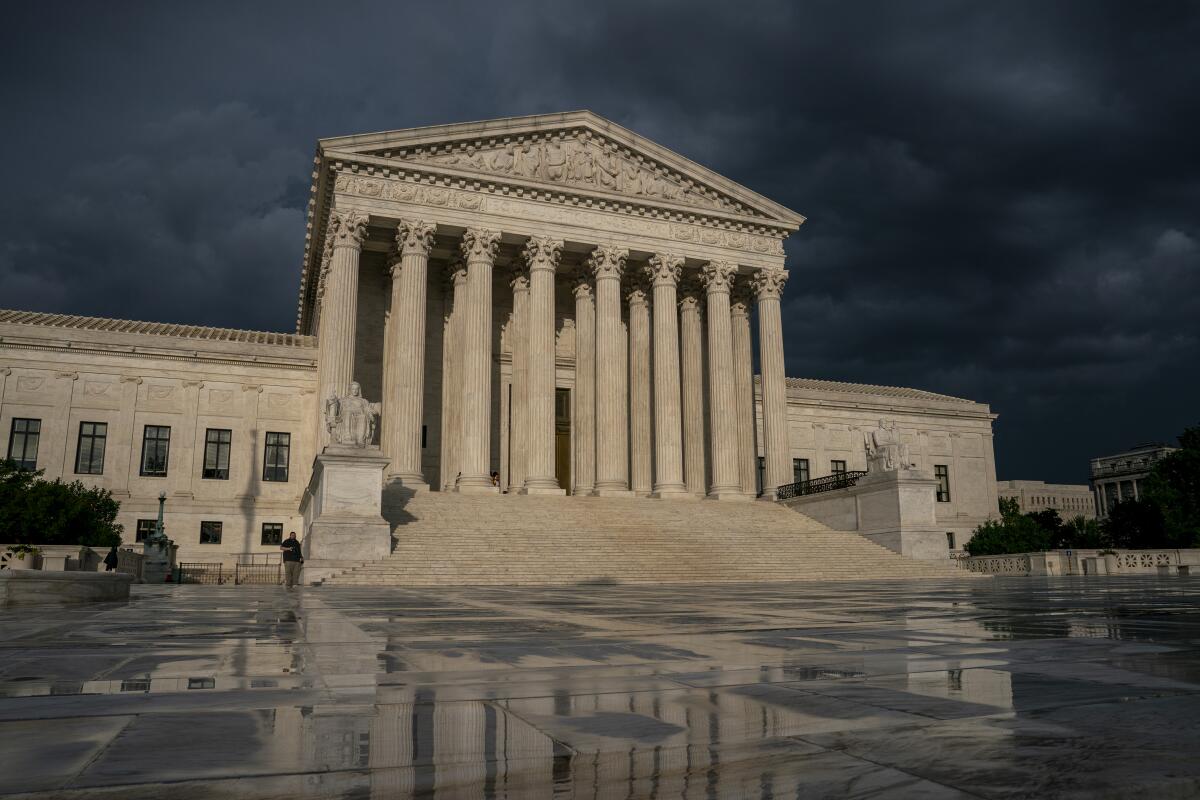Supreme Court signals it’s likely to bolster the right to carry a concealed gun in public

- Share via
WASHINGTON — The Supreme Court’s justices, citing the right to bear arms in the 2nd Amendment, sounded ready Wednesday to strike down laws in New York and California that deny most gun owners permits to carry concealed guns in public.
Most of the justices said people who live in “high-crime areas” and fear for their safety should be allowed to carry a gun for self-defense. And they said this applies equally to people who live in cities as well as in rural areas.
“Think about people who work late at night in Manhattan,” said Justice Samuel A. Alito Jr. “It might be somebody who cleans offices. It might be a doorman at an apartment. It might be a nurse or an orderly [or] somebody who washes dishes” who is “scared to death” to head home. “How is it consistent with the core right to self-defense” to deny that person the right to have a gun with them? he asked.
In defense of New York’s law, state Solicitor General Barbara Underwood argued for limiting the number of guns in densely populated areas. Too many guns in too many hands would increase the danger of gun violence, she said.
But Chief Justice John G. Roberts Jr. and Justice Brett M. Kavanaugh disputed that view and said people there may have a greater need to protect themselves with a gun.
“How many muggings take place in the forest?” Roberts asked her.
Kavanaugh said the 2nd Amendment protects a right to have a gun for self-defense, which suggests the decision to be armed should rest with the gun owner, not a state or local licensing official.
“Why isn’t it good enough to say I live in a violent area and I want to be able to defend myself?” he asked.
During their comments and questions, the court’s six conservative justices made clear they are highly skeptical of laws that authorize state or local officials to deny gun permits to law-abiding residents.
Only the court’s three liberal justices spoke in defense of these laws and said there has been a long history of regulating guns in public.
Still, a gun rights ruling in the New York case could be limited. The justices, both conservative and liberal, said cities and local governments would not be prevented from enforcing bans on guns in “sensitive places,” and that could include subways, football stadiums and university campuses.
“Can’t we just say Times Square on New Year’s Eve is a sensitive place?” said Justice Amy Coney Barrett.
Washington attorney Paul Clement, who was representing the gun owners, avoided a clear answer on where guns could be excluded, but he agreed the city would retain that authority to restrict guns in certain places.
At issue on Wednesday in the case of New York State Rifle & Pistol Assn. vs. Bruen were the laws in New York as well as similar measures in California and six other states that limit who may obtain a license to carry a concealed handgun in public.
Typically gun owners are required to show they have a “special need” or “good cause” to be armed, not simply a general fear for their safety. In New York City and Los Angeles, these permits are rarely granted.
UCLA law professor Adam Winkler, who has written widely on the 2nd Amendment, said the outcome could force local officials to shift their focus to declaring certain places off-limits to guns.
“New York may be forced to allow more people to carry but can still broadly define sensitive places to make it hard practically to carry in New York City,” he said.
The ruling will also have a direct effect in California as well. “If New York’s law is struck down, the precedent will lead to overturning California’s carry laws too,” he said.
Gun control advocates heard little to cheer from the argument.
“We are on high alert about the dangerous consequences of a potential ruling in favor of gun extremists,” said Hannah Shearer, litigation director for the Giffords Law Center. “But the court still has an opportunity to reject the unprecedented and historically inaccurate view that the 2nd Amendment precludes meaningful gun safety regulations in public.”
But Eric Tirschwell, executive director of Everytown Law, pointed to the justices’ comments about restricting guns in sensitive places.
“Even the court’s most conservative justices have hesitations about granting the gun lobby its ultimate goal in this case — the unrestricted right to carry guns in all public places,” he said.
The case heard Wednesday and the likely outcome highlight the change in the makeup of the court.
In the last decade, the justices had turned down several challenges to the gun-permitting laws, including in California. But with the arrival of Justices Kavanaugh and Barrett, the court appears to have a new majority to bolster individual rights under the 2nd Amendment.
The case began when Robert Nash and Brandon Koch, who live near Albany, N.Y., applied for general concealed-carry permits but were turned down by a county judge because they did not “face any special or unique danger.” They were, however, licensed to carry guns for hunting or target shooting.
They sued along with the New York State Rifle & Pistol Assn., alleging the restrictions violated their rights under the 2nd Amendment to bear arms for self-defense.
More to Read
Get the L.A. Times Politics newsletter
Deeply reported insights into legislation, politics and policy from Sacramento, Washington and beyond. In your inbox three times per week.
You may occasionally receive promotional content from the Los Angeles Times.











